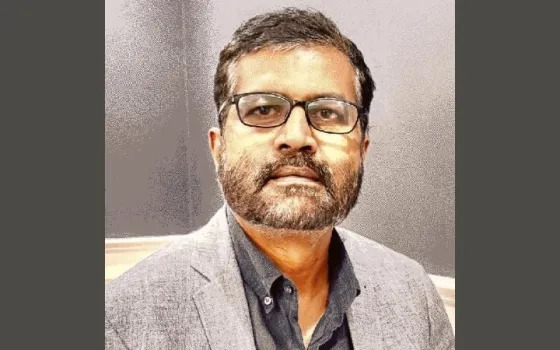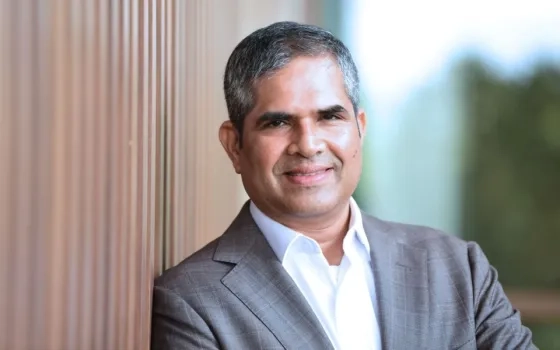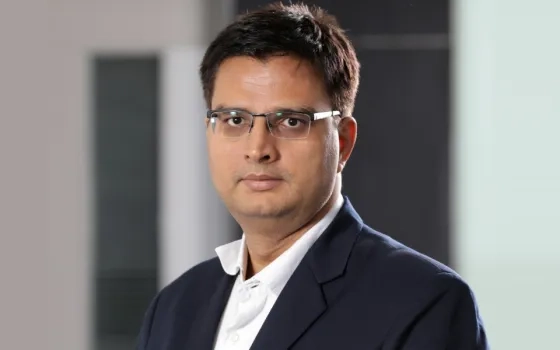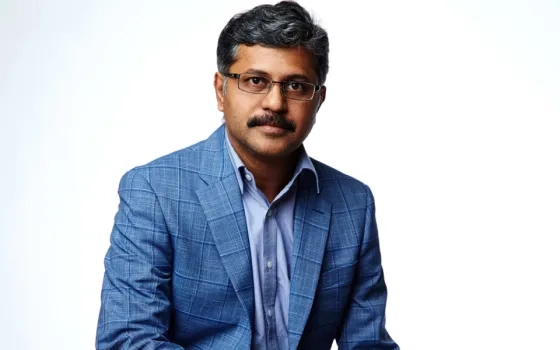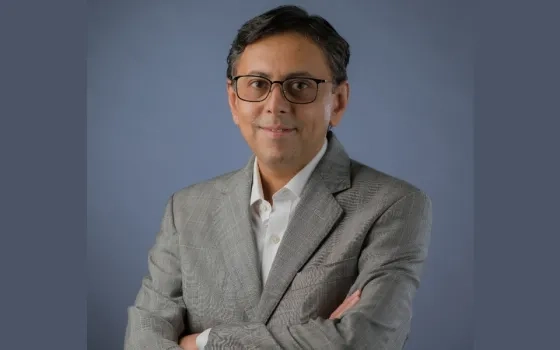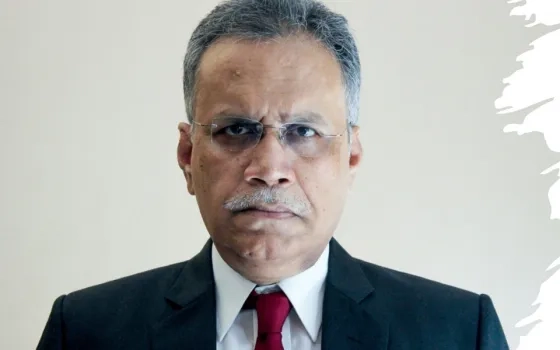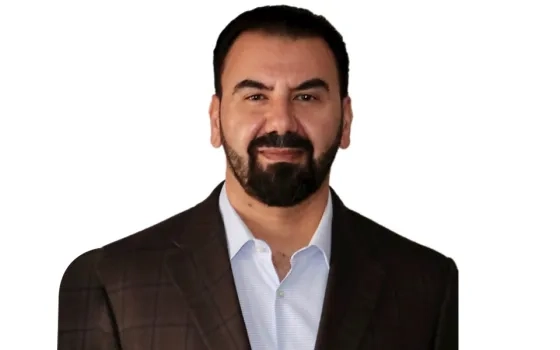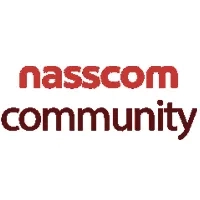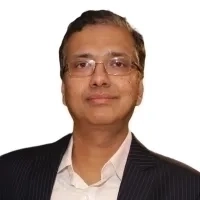
NASSCOM staff writer in conversation with Srikanth Velamakanni, Group Chief Executive & Executive Vice- Chairman, Fractal Analytics.
- Reminiscing the Fractal journey.
Set up in the year 2000, Fractal Analytics was a result of deep foresight, the founders had – a belief that Mathematical Tools could be applied to critical business applications, to improve quality and help businesses make more money. Early days then, India was still a few years away from being fully conversant with the term “Analytics” and its applications. In more ways than one, the company was ahead of its time. Also, having started from India it was common enough to be constrained on resources and the accompanying challenges.
The first client was ICICI. Fractal developed a Statistical Scorecard for them which automated loan processing. It was as easy as applying for a loan, getting it approved within a very short time and the applicant walking home with a TV set in tow, for instance. To ICICI’s credit, they were forward looking in their approach even back then. Recently Srikanth came across an article about automating the Underwriting process using AI. Impressive as it was, but it struck Srikanth as quite remarkable that obvious comparisons could be drawn with Fractal too, which had introduced automation in Underwriting in its early days, though they may not have consciously branded it as an AI application.
The other notable customer in its early days was HUL (HLL at that time). Mathematical models were applied to de-code changing buyer behaviour to help the FMCG giant strategize its marketing activities.
The next stop was at Citibank, and about convincing PhDs why they should consider a Fractal product. A predictive approach to help the bank sell personal loans more efficiently and increase its market share. “Analytics” as a powerful tool, was still largely unexplored in India at that time.
What really worked: Great team, niche solutions; and, analytics was still a relatively unexplored domain. The company continued to put a very high premium on talent which shaped its phenomenal growth over the years. And of course, the expansion to US shores within the next 4 years worked very well. Spurred on by competition overseas, the company improved on its offerings significantly, and forayed into new markets as well.
Around 2007, Fractal faced a leadership crisis of sorts. Within a very short period, there was attrition at the top which proved to be very challenging. Though operations weren’t impacted adversely, but it required some effort to align the team once again to the company’s vision. Having completed more than 7 years, the company had not only survived but thrived as well, and clearly, it had entered the next phase. Post 2009 – 10, it was a high growth phase for the company. In 2013, Fractal raised capital, from institutional investors, to the tune of 25 million USD which was followed by another round of 100 million USD in 2016. Presently there are well over 1000 Fractalites across the globe. Mathematical models are selected according to the data available, but most importantly it is about having an in-depth understanding of the domain and specific industry-wide metrics which will lead to effective problem solving. In addition, the contextual understanding of data is critical. As Srikanth likes to put it, “Both conceptual and contextual, create magic.”
- His thoughts on talent that is available in India.
The country’s biggest advantage is its people. Arguably, it’s the way you look at it. Nevertheless, a selective search will reveal that India does have a highly talented workforce. Its sheer size puts it in an advantageous position over other geographies. The other unique feature about India – and worryingly enough – is the sudden and precipitous drop in the quality of talent beyond this selective crop. The much avowed “war on talent” is because recruiters are essentially tapping into the same pool which is not able to grow appreciably, as required. Just to put things in proper perspective, Fractal recruits around 200 people annually, for which it receives close to 30k applications.
Typically, the organisation seeks out “intellectual horsepower” and the right attitude in its hires. “Direct relevant experience” as Srikanth says, is not easily available or they come with a very high price tag. Again, the emphasis is on good grounding, learnability and EQ. They are extremely clear-minded about what they seek in individuals which helps them sift through the mountainous applications very quickly. Over time, Fractal has participated in campus recruitment from premium institutions, like the IITs, ISI, DSE, IIMs among others, which provide a steady flow of critical talent.
We asked him, if Analytics was also being leveraged for recruitment. Right now, the applications were limited from that perspective, but new solutions would soon be underway which would help in identifying the right candidates in a more precise manner. Presently, there’s a strong reliance on face-to-face interviews to seek out the right talent.
Since client-facing is critical to their business, a very high degree of empathy is required. The face-to-face interviews are rigorous, and it is imperative that all members of the selection panel agree, before the green signal is given. Srikanth is quite candid, when he asserts, “the system is one of elimination.” As always, efforts are on to devise a process which is more scientific.
- What he feels about “software is eating the world.”
That was certainly the case earlier. “Currently, it’s AI that is eating the world”, he said. Automation is happening at a pace that was hitherto not possible, and getting into areas which weren’t imagined either. Consider the phone for instance. Till a few years back, was it even conceivable what the smart phone was really capable of? Challenges to employment notwithstanding, automation will lead to significant increase in productivity to create wealthier societies.
When societies are in the early stages of development, the focus is on solving the basic needs. Today, we have gone past that, at least in many parts of the world. In process, it has birthed great inequalities in income distribution. The question before mankind today has to be, “Whether AI can be leveraged to address this gap and bring about a sense of equality, or even a semblance of it?”
The two crucial factors of production are labour and capital. In Western countries, the cost of labour is considerably higher so the need to automate is significantly greater, in comparison to developing nations, where labour is still cheap and in excess. However, in reality, the cost of capital is on the decline and a sharp one at that. Even in developing nations, it is only a matter of time that machines will play catch-up and eventually turn up as a cheaper and more efficient alternative.
- His thoughts on Analytics – where are we today and how far are we likely to go?
Analytics has finally seen the light of day. Even as recent as 3 – 5 years back, only about 10% of the people believed in it. Today, this number is appreciably higher – perhaps 50% or more and growing at a phenomenal pace. The progression made in just a few years, has been extraordinary.
Data is central to everything that we do. Even the way we connect with one other, and though we are still in the early days, the next couple of years will be most critical. Awareness feeds on successful used-cases, and unlike the past there are many today which strengthens the argument in favour of Analytics and allied technologies. Once again he referred to smartphones. It is integral to our lives today and yet there’s a prevalent belief in the tech community that the era of smartphones is finally ending. We may be witnessing something far more powerful where the sheer power of computing may be a ubiquitous force multiplier. Perhaps we are not very far from that day when we will take Analytics too for granted, just as we do with the internet today. Can we imagine a future, say in 2050, where driving cars may actually be a bad idea, direct fallout of driverless cars? Perhaps, yes!
- The organisational culture at Fractal.
Fractal is always meant to be a “great place to work”. People should aspire to work here and be able to say it with pride to their peers. Empathy, is something we mentioned earlier and one of the guiding principles from an organisational culture standpoint. The young people today want the organisation to trust them and not be micro-managed. At all times they seek clarity, transparency, guidance but also the freedom “to play the game themselves.” The other unique ask among Gen Y is information, a lot more information, still more information and some more. They want to communicate and be communicated to all the time, but frankly, it isn’t always possible for the leaders to meet up to their exacting standards.
All these thoughts are nicely bucketed under “People Principles” and what does it take to be a Fractalite. An interesting yardstick the company has adopted is about measuring the number of people who want to come back. In addition, on a quarterly basis, a short survey constituting about 10 questions is circulated to the employees. The idea is to assess the level of employee engagement in the organisation. On a scale of 1 – 5, 4 or 5 would mean high levels of engagement. So far the average score has been 3.7. The employee engagement ratio is impressive at 4:1. For every 4 engaged employees, there’s only 1 who is not well engaged.
In equal measure, Townhalls are held every quarter which last upto 2.5 hours and provide an opportunity to mainly answer employee related queries. Yet another interesting engagement tool is Fractal All Fridays, where between 4 – 6 PM (on certain Fridays) the senior leadership is fully accessible. People can just walk into a designated room and speak to their leaders. It’s a two-way street and leaders get a feel of the pulse of the organisation.
- On collaborative model and working with start-ups
They are conscious about the need to build strong alliances and working with eco-system partners (including start-ups) to create integrated offerings for their clients. Srikanth is quite candid about the fact that this is one area which needs a stronger focus.
- On Business Pivots, things that have been done differently and bets for the future
Business Pivots:
- Building an Analytics business in India and scaling it globally.
- Post 2008, adopting a pure client-centric approach to business. A transformational impact to clients’ business was rendered.
- Created smaller units – SBUs and having a product-centric approach.
Things that could have been done differently:
- In hindsight, it may have been a wiser decision if the business was initiated in US, instead of India.
- In 2007, when the company was faced with attrition at the top which subsequently led to a temporary crisis, at that time perhaps things could have been handled in a better way.
- Across the board, there’s a dichotomy about believing in people, providing them adequate mentorship and finally having to let them go if the relationship doesn’t work out. In some cases, the timing could have been better. Unless done efficiently and in a humane manner, it sets a wrong precedence and impacts the work culture adversely. Often, too much of leeway can be as detrimental as too little.
The Big Bet is obviously about AI and Deep Machine Learning. For instance, how can the healthcare sector be transformed through AI and its services be made more affordable and accessible to every nook and corner of the country.
To read more interviews, follow






